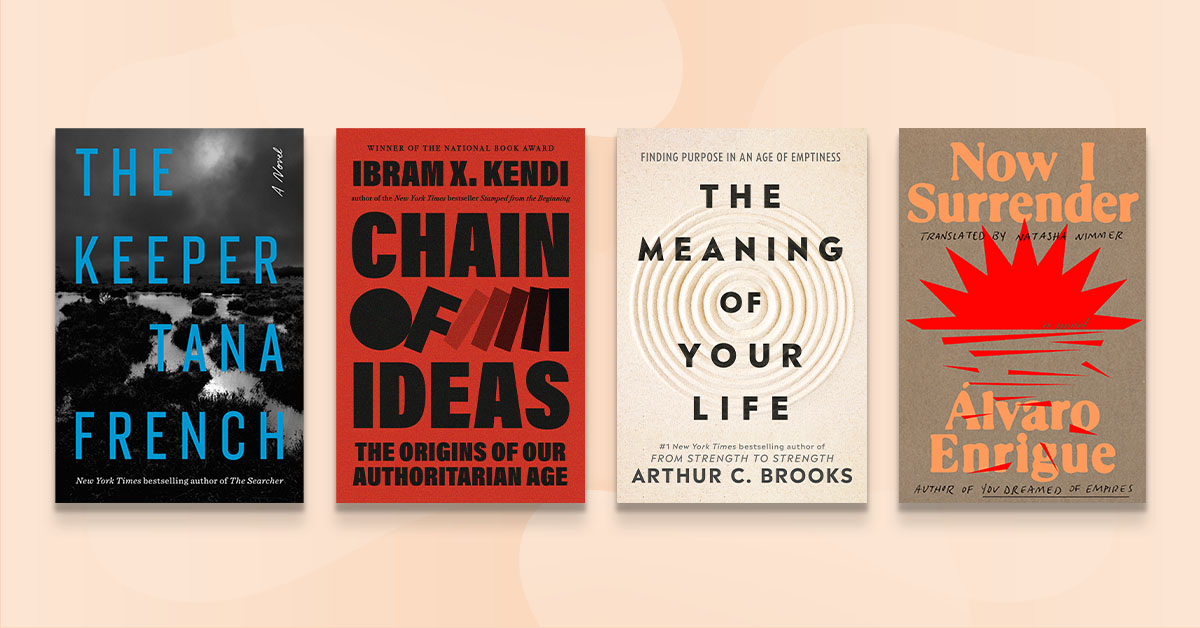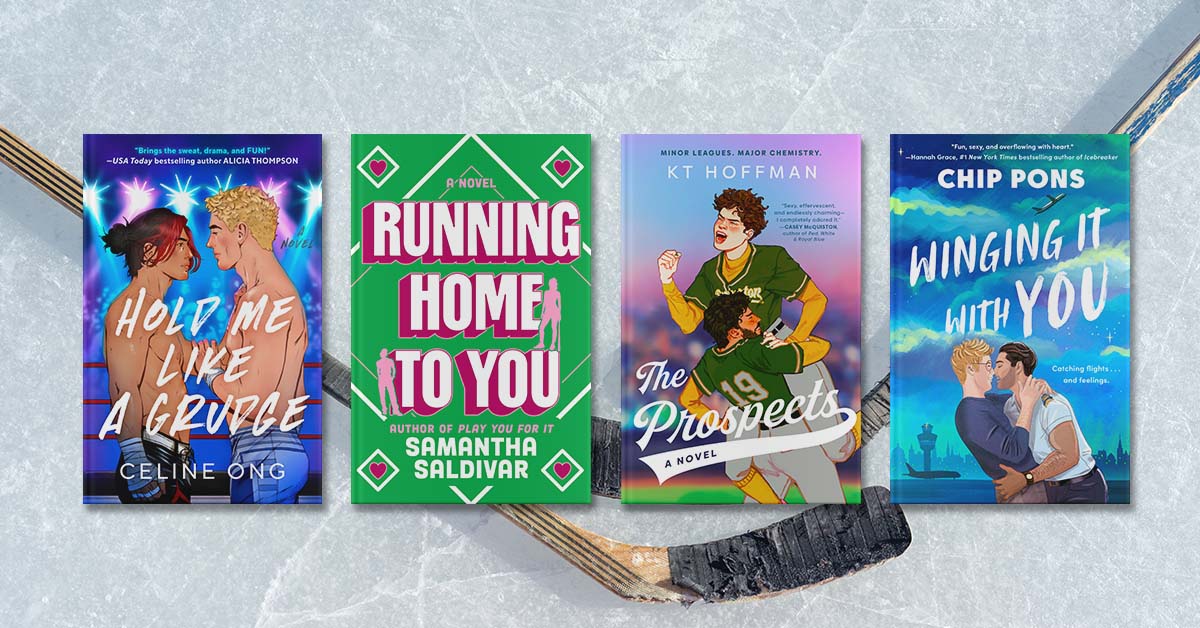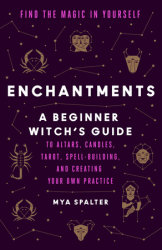Books by Mya Spalter
Author Q&A
Editor’s Note:
Mya Spalter has spent years among candles, herbs, cats, and spells as an employee at New York City’s oldest occult shop, Enchantments. Her book, Enchantments, is a wise, witchy, and welcoming guide to living life magically.
From beginning to end, Mya Spalter’s Enchantments: A Modern Witch’s Guide to Self-Possession celebrates the necessity of intuition and the limitless potential of self love and intention. Inspired by Spalter’s own journey as a witch, Enchantments honors not only the namesake of the book – the oldest occult shop in New York City – but also the communities, spells, hardships, and joys that helped Spalter find her voice and embrace her inner magic. Part grimoire, part memoir, Enchantments gives readers a diverse offering of spells, tools, and rituals that are as practical as they are powerful. Written with wisdom, humor, and compassion, Spalter’s book is the perfect companion for those seeking “meaning, peace, and self-possession.”
In anticipation of her spellbinding debut, we spoke with Spalter about how she manifested her book, the way ritual can lead to liberation, and why covens and community matter.
PENGUIN RANDOM HOUSE: What is your earliest memory of manifestation (either your own or the experience of witnessing the power of someone else’s manifestation)? How did embracing your personal power impact your life and creative process?
MYA SPALTER: I think my earliest magic memory would probably be when I was about 5, jumping on my parents’ bed. The window was open and the air was the perfect temperature and when I jumped and hung suspended in the perfect air for a moment, I was self-conscious of my body in space … but like, literally in space, you know? The same way the stars and planetary bodies just seem to be hanging suspended in the firmament. I think I got an inkling of something in that moment that has informed my practices of witchcraft and writing – that we live in a metaphorical universe.
PRH: In the introduction of your book, you mention the necessity of intuition and the way it can give you the ability “to enthrall yourself to your own spirit.” Can you talk a little bit about how intuition led you to this project? What was the initial spark or genesis behind this book?
MS: I asked a friend of mine to read my tarot cards two years ago, this month. We met near Tompkins Square and one of the questions that came up for me in the reading was “What the heck am I going to do for work?” I’d been home with my son for years and he was starting school, and I was starting to lose my mind around the house. Oh, and we were broke! And I’m a writer! Even working writers are still, often kinda broke. And a card came up in the reading that indicated an opportunity to make some money – not a lot, but it would be the gateway to what I was really looking for. I found that hopeful. Afterwards we walked by Enchantments and decided to stop in. I ran into Stacy Rapp, the head witch in charge, and she asked if I might like to pick up a shift, and with the reading in mind, I went for it. Within weeks a viral video sent us droves of eager new customers, many of whom had the same general questions about magic and witchcraft. When I saw how many people were interested and figured out what they were most curious about, it seemed natural that I should write a book about it, and here we are.
PRH: Throughout Enchantments, you mention the transformative potential of ritual and spellwork for individuals and communities as a whole. Whether it be a form of activism, a way to cope with personal crises, or a way to grapple with creative blocks, what do you feel ritual and spellwork can offer your readers when it comes to transformation or healing? How has ritual and spellwork healed you?
MS: I like the way you pose the question. Different witches find their practices different ways, but regardless of the starting point, I think a ritual practice that’s holistic will naturally do all three. Self-care keeps coming up as a term for what witchcraft has to offer, and I think that’s apt, but misses this point: Caring for yourself is an endless process and once you approach and move through your creative blocks, there will be new ones. I guess I mean to say that people who are on their path, people who care for themselves, and people who feel full and are honoring their own spirit are almost always lead by that process to help people and other beings on the earth. And I’m noticing that the more popular witchcraft becomes as a cultural trend, the more space there is for discourse around witchcraft as a tool for collective liberation. I think in the end that’s what truly self-cared for people do: They work to bend the world toward justice. And they do it in the ways that are particular to their own strengths. And it’s what self-cared for people are equipped to do from all that intentionally spent time following their own interests, learning the properties of plants, mixing spells, making baths, carving candles, etc.
PRH: While you were writing this book, what was your biggest challenge? What did that challenge teach you about yourself as a writer? As a witch?
MS: This sounds very silly, but the hardest part is the typing. I haven’t figured out how to be comfortable at the keyboard for long periods of time. As a witch, I feel like I did the hard part a long time ago when I wasn’t writing. That was awful. No matter how hard writing is, not writing is harder.
PRH: I really enjoyed the way each chapter of your book gives readers a foundational understanding of witchcraft and which tools they can use in their own practices. I also really admire the way you intertwine your own experiences throughout with such wit and vulnerability. The end result is vivid, yet balanced and instructive. What were your intentions for the tone and structure of Enchantments? Were there any books or voices that helped you discover the structure and overall (for a lack of better terms) aura of your book?
MS: Thanks! I intended to give people who would never visit Enchantments a simulated experience of coming to the store on the perfect day when everyone was being hilarious and willing to answer every question you could think of. I was trying to capture the shorthand that we’ve collectively developed trying to explain complicated mystical concepts on the spot, and in few words, all the time. We’ll reach for any metaphor we can think of! It’s great work for a poet. I also stole a bunch of the really funny stuff from Nette. She’s brilliant. But in terms of books, I’m really inspired by Sara Gran’s Claire de Witt mystery series. Claire is the hard boiled, metaphysical detective of my dreams.
PRH: In your chapter on magical collaboration, you focus on necessity of community, whether it be IRL or online, and how connecting with others can be fulfilling. Right now the archetype of the witch and all that comes with it is having a bit of a resurgence in our culture, which has fostered inclusivity in some respects but also flattened the narrative due to the mainstream monetization, commodification, and appropriation of the witch. For you, how has community kept you grounded in your practice and identity? How has community helped you be true to your vision and voice?
MS: First I’ll say that the magical community I’m talking about in this book is a retail operation, so in terms of monetization and commodification, we’re definitely doing that at Enchantments as we accept money for goods and services toward spiritual ends. Given that, we’re notorious down-sellers. We make no secret of the fact that the only difference between the candle that costs 65 cents that you carve yourself and the candle that costs $36 dollars that we carve and dress for you is the amount of wax involved, and who performs the labor. The materials don’t matter so much as long as they’re appealing enough to your senses. If they’re sticky enough to hold on to your intention, whatever your magical tools are will serve as a vehicle for externalizing your vision and making it real in the world. What I love about witchcraft as I practice it is that it’s not a hobby, or an intellectual field of study. It’s what I choose to do with the overflow of my feelings. I act them out in a sympathetic manner to try to make sense of them and try to find my way. That doesn’t cost money. And often the ritual that accompanies that magical intention is talking with my friends, all of them witches, even if they wouldn’t always describe themselves that way.
So, yes, for sure my community keeps me grounded. I can’t imagine what you’d be grounded in if not in your community.
PRH: Has writing this book impacted your current relationship to spellwork? Did this project reveal or affirm anything new to you that resonated with you in relation to past or recent spellwork? Did your spellwork inform your writing in any way?
MS: The book is a product of a spell I started in 2011. It’s still revealing and affirming itself, so it feels too soon to say what impact it’s had. But yes, there was a point when I wasn’t sure how to combine my skills and interests in a way that would be fulfilling and allow me to help support my family, while still allowing me the time to actually see them, and I made a spell that’s been doing just that. It took years, though. And a lot of faith, but that’s something I have in great quantity, apparently. There were so many moments of synchronicity in the process of writing this book, so many uncanny, pivotal little coincidences along the way. I think of those moments as little signposts that make it clear when you’re moving in the right direction. As long as I’m following the path with the little signposts, I know I’m on the trail that leads to my goal. None of that is to say that I don’t get impatient, cry, and freak out all the time. I do. Often. Especially in the context of such a big project.
PRH: In the conclusion to Enchantments you write, “when you have faith that your thoughts, energy, and actions—that you yourself—are enough to make change in your life, magic happens.” Your path as a witch and a writer and your book feel like direct proof of that. Looking back, what words of affirmation would you give yourself in the past, before you harnessed the power of your intentions and words?
MS: I think that little affirming voice from your future self is always there, but it can get drowned out pretty easily by worry. I’d remind myself to listen for it.
Visit other sites in the Penguin Random House Network











